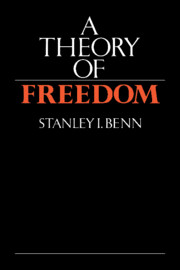Book contents
- Frontmatter
- Contents
- Foreword
- Preface
- Acknowledgments
- 1 Persons and values
- 2 Practical rationality and commitment
- 3 Reasons in conflict: Quandaries and consistency
- 4 Values and objectivity
- 5 Natural personality and moral personality
- 6 The principle of respect for persons
- 7 Freedom of action
- 8 Freedom as autarchy
- 9 Autonomy and positive freedom
- 10 Autonomy, integration, and self-development
- 11 Self-realization, instinctual freedom, and autonomy
- 12 Autonomy, association, and community
- 13 Human rights and moral responsibility
- 14 The principle of privacy
- 15 Interests in privacy
- 16 Conclusion: A semantic theory of freedom
- Notes
- Index
8 - Freedom as autarchy
Published online by Cambridge University Press: 04 December 2009
- Frontmatter
- Contents
- Foreword
- Preface
- Acknowledgments
- 1 Persons and values
- 2 Practical rationality and commitment
- 3 Reasons in conflict: Quandaries and consistency
- 4 Values and objectivity
- 5 Natural personality and moral personality
- 6 The principle of respect for persons
- 7 Freedom of action
- 8 Freedom as autarchy
- 9 Autonomy and positive freedom
- 10 Autonomy, integration, and self-development
- 11 Self-realization, instinctual freedom, and autonomy
- 12 Autonomy, association, and community
- 13 Human rights and moral responsibility
- 14 The principle of privacy
- 15 Interests in privacy
- 16 Conclusion: A semantic theory of freedom
- Notes
- Index
Summary
The free-choice situation
Chapters 5 and 6 dealt with the principle of noninterference, which, it was claimed, was grounded in our conception of a natural person, and in the conceptual linking of natural and moral personality. From the principle of respect for persons which follows from this linking derives not only the principle of noninterference but also the principle of equal consideration of interests. In Chapter 7 coercion, duress, and extortion were distinguished from other influences on actions, such as counseling, providing an agent with fresh information, or making him offers, which, in standard cases, would not count as the kind of interferences for which justification need be provided, because they do not restrict the options available to a decision maker or a chooser.
Handcuffing Alan, clearing all the pebbles in his vicinity to prevent his engaging in his favorite pastime of splitting pebbles on the beach, imposing penalties on anyone caught splitting pebbles, charging $1,000 for a pebble-splitter's license, or under some conditions demanding exorbitant rates for the right to split pebbles on the only pebbly bit of the beach would be paradigmatic ways of interfering with Alan's freedom to split pebbles.
- Type
- Chapter
- Information
- A Theory of Freedom , pp. 152 - 169Publisher: Cambridge University PressPrint publication year: 1988



